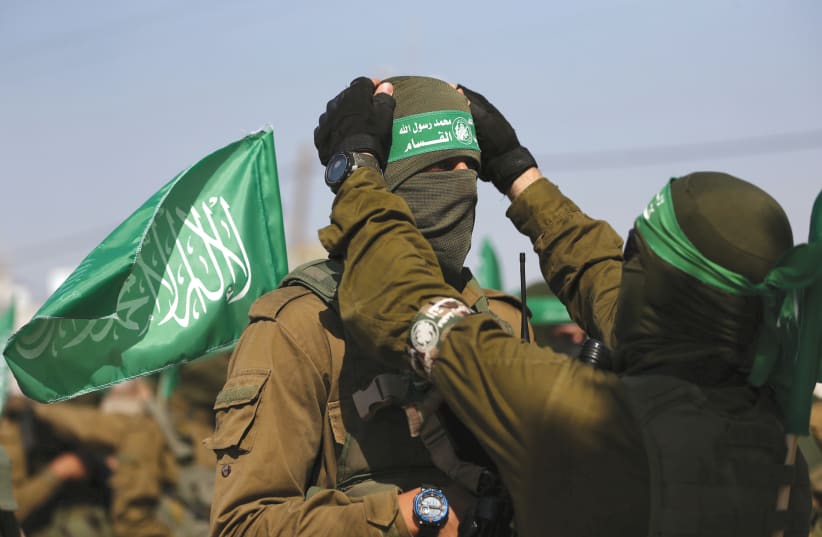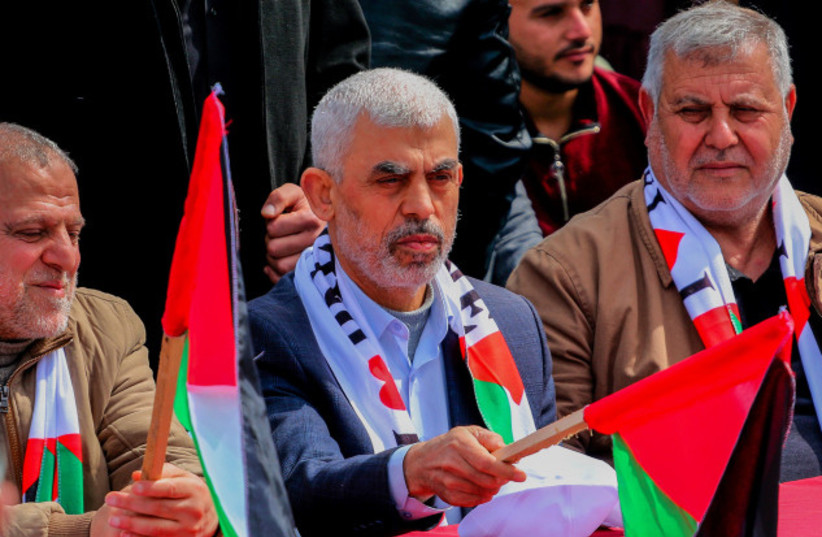Palestinian pollster Khalil Shikaki released a survey of Palestinian attitudes on Wednesday – the third since October 7 – showing that fully 61% of Palestinians in the West Bank and Gaza would prefer to see Hamas in control of the Gaza Strip and that support for the terrorist organization far outstrips that of Fatah.
Nevertheless, the headline of a New York Times front page article on Sunday read, “Gazans voice their distress under Hamas.” The online headline to the story was, “As war drags on, Gazans more willing to speak out against Hamas.”
Three days after a prominent Palestinian pollster referred to as such by a senior New York Times writer in November, released a poll indicating one trend among Palestinians, the Times published a front-page article that seemed to contradict those poll findings.
While the poll showed strong support for Hamas among Palestinians, the Times article, based on “interviews with nearly a dozen Gaza in recent months,” portrayed a different narrative of dissatisfaction with Hamas rule in Gaza.The article acknowledged that while gauging public opinion in Gaza is more difficult now even than it was in the past and, in some instances, renders contradictory results, “some recent surveys reflect the weak or mixed support in Gaza for Hamas and its leaders.”
A poll conducted by the Palestinian Center for Policy and Survey Research in Gaza and published this past week showed that support in Gaza for Hamas leaders is slightly higher and that the share who are satisfied with Hamas leadership in the territory has risen since December.”
Shikaki’s poll, unlike the one from March cited by the Times, found that the percentage of satisfaction with Hamas and Sinwar remains very high. Some 65% of all Palestinians said they were satisfied with Sinwar’s performance during this war (76% in the West Bank and 50% in Gaza.)
Since the beginning of the war, according to an in-depth study of New York Times coverage from October 7 to May 7 by Maariv journalist Lilac Sigan, the Times has presented a skewed picture of the war, with the stories heavily empathetic to the Palestinians and critical of Israel.
This story fits that pattern, since short shrift is paid to Shikaki’s poll taken just days earlier, which punches holes into the Times’ overall portrayal of the conflict.
Not only do the poll’s findings not align with the narrative of the war dominating the New York Times’ coverage, but they also are at odds with several basic assumptions other actors – including US President Joe Biden and his administration – have as well. One is an idea Biden already began articulating in a speech to the American people on October 20 – that Hamas does not represent the Palestinian people.
Most Israelis, with all their heart, wish that were true. The problem is that they have seen nothing now or over the years to support that assertion. Not only that, but these polling numbers indicate this assumption is just wishful thinking.
First of all, according to the poll, 67% of Palestinians, including 57% of those in Gaza, believe Hamas’s decision to launch its attack on Israel on October 7 was correct, with only 26% taking issue with it (41% in Gaza.)
Secondly, 75% of all Palestinians, and 64% of those living in Gaza, say they are satisfied with Hamas’s performance during the war, a war that Hamas ignited and that has brought horrible death and destruction to that coastal enclave and its people.
Thirdly, when asked which political party they favor, the largest percentage of all Palestinians (40%) say Hamas, followed by Fatah at 20%. In Gaza, Hamas outpolls Fatah 38% to 24%, with the rest either not knowing or preferring a third party.
Another badly mistaken assumption – and a central pillar of the American administration’s vision for the “day after” – is that a new revitalized Palestinian Authority, with a newly elected president, parliament, and government, could take over Gaza. That might be what the Biden administration and much of the West want, but not something favored by the Palestinians themselves.
According to this poll, only 16% of the total Palestinian population – including 24% in Gaza – want to see this scenario. On the matter of the Palestinian Authority and its President Mahmoud Abbas, fully 89% of the Palestinians want to see him resign, with that number reaching 94% in the West Bank, where he still has some nominal control. His hand-picked Prime Minister Mohammad Mustafa is not faring much better in the poll, with just 9% of the Palestinians, and only 6% in Gaza, satisfied with his performance.
Another assumption widely held abroad, but not supported by the polling, is that all the Palestinians want is a two-state solution. According to the poll, only 32% support a two-state solution, with the numbers the same both in Gaza and the West Bank.
When asked about their support or opposition to various measures preferred to break the long stalemate in the diplomatic process, 22% supported abandoning the two-state solution for a one-state solution, 49% said to resort to “popular non-resistance,” 62% said to “dissolve the PA,” and fully 63% said to resort to an “armed intifada.”
After eight months of war, 54% of the respondents, and 56% in Gaza, said the “best means of achieving Palestinian goals in ending the occupation and building an independent state” was through “armed struggle,” with only 25% opting for negotiations.
Interestingly, three-quarters of the respondents said they opposed a Saudi-Israeli normalization deal, even if it was conditional on Israel accepting the idea of a Palestinian state and taking concrete steps to actualize that goal.
While the poll showed little ardor for an Israeli-Saudi rapprochement, it did show a great deal of appreciation for Yemen, whose Houthis have intermittently targeted shipping in the Red Sea and fired ballistic missiles at Israel.
Asked about their level of satisfaction with various regional players, 80% said they were satisfied with Yemen’s performance during the war, while 57% said they were satisfied with Hezbollah and only 18% with Egypt.
The sample size of this poll was 1,570 adults, of whom 760 were interviewed face-to-face in the West Bank and 750 in central and southern Gaza Strip, but not the northern part of the enclave or areas of combat in central Gaza and eastern Rafah. The poll had a +/-3% margin of error.

